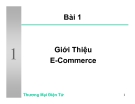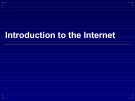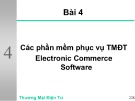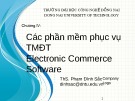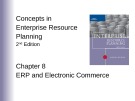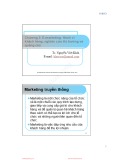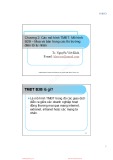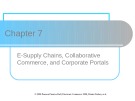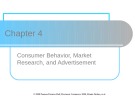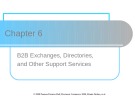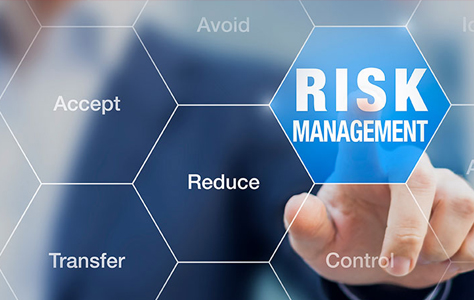
Electronic commerce
-
Research evaluates the impact of transformational leadership on team member exchange quality and employees’ proactive work behavior. With a sample size of 619 employees working at 50 business brands of electronic (E-COMMERCE) in Vietnam, results of analyzing data with SPSS and AMOS shows the same impact of transformational leadership on team member exchange quality and team member exchange quality on OCBs.
 12p
12p  viuchinaga2711
viuchinaga2711
 21-10-2021
21-10-2021
 23
23
 6
6
 Download
Download
-
Thương mại điện tử (còn gọi là E-Commerce hay E-Business) là quy trình mua bán hàng hóa và dịch vụ thông qua các phương tiện điện tử và mạng viễn thông, đặc biệt làtrực tuyến qua máy tính và mạng Internet. Thương mại điện tử (Electronic Commerce), một yếu tố hợp thành của nền "Kinh tế số hóa", là hình thái hoạt động thương mại bằng các phương pháp điện tử; là việc trao đổi thông tin thương mại thông qua các phương tiện công nghệ điện tử mà nói chung là không cần phải in ra giấy trong bất cứ...
 55p
55p  vanluc2it
vanluc2it
 03-06-2013
03-06-2013
 108
108
 28
28
 Download
Download
-
Tham khảo tài liệu '102 bí quyết thương mại điện tử cuốn bí quyết thương mại điện tử (secret of electronic commerce) hướng dẫn xuất nhập khẩu cho các doanh nghiệm vừa và nhỏ', kinh doanh - tiếp thị, thương mại điện tử phục vụ nhu cầu học tập, nghiên cứu và làm việc hiệu quả
 136p
136p  chitien9252
chitien9252
 05-08-2013
05-08-2013
 138
138
 23
23
 Download
Download
-
Giới thiệu TMĐT Thương mại điện tử (Electronic-commerce) Có nhiều định nghĩa khác nhau nhưng nhìn chung E-commerce là hình thức giao dịch mua bán hàng thông qua các kỹ thuật điện tử hay cổng thông tin thương mại, thường là Internet. Về cơ bản việc giao dịch, trao đổi mua bán thường là ảo nhưng việc giao hàng và.Thương mại điện tử thông thường được xem ở các khía cạnh của kinh doanh điện tử (e-business). Nó cũng bao gồm việc trao đổi dữ liệu tạo điều kiện thuận lợi cho các nguồn tài chính và các khía cạnh...
 74p
74p  ntgioi120406
ntgioi120406
 30-11-2009
30-11-2009
 260
260
 113
113
 Download
Download
-
Thương mại điện tử, hay còn gọi là e-commerce, e-comm và EC, là sự mua bán sản phẩm hay dịch vụ trên các hệ thống điện tử như Internet và các mạng máy tính.[1][2] Thương mại điện tử dựa trên một số công nghệ như chuyển tiền điện tử, quản lý chuỗi dây chuyền cung ứng, tiếp thị Internet, quá trình giao dịch trực tuyến, trao đổi dữ liệu điện tử (EDI), các hệ thống quản lý hàng tồn kho, và các hệ thống tự động thu thập dữ liệu. Thương mại điện tử hiện đại thường sử dụng mạng...
 106p
106p  ntgioi120406
ntgioi120406
 30-11-2009
30-11-2009
 246
246
 80
80
 Download
Download
-
Thương mại điện tử (tiêng Anh là e-commerce hay electronic commerce) đượ c đị nh nghia ngan gần như sau “TMDT là viec th?c hien các ho.t dong thương mại dựa trên các công cv dien t5, dac biet là Internet và WWW.”
 26p
26p  haxuanlinh9x
haxuanlinh9x
 16-04-2010
16-04-2010
 285
285
 147
147
 Download
Download
-
E-Commerce là gì? E-commerce (Electronic commerce - thương mại điện tử) là hình thái hoạt động thương mại bằng phương pháp điện tử; là việc trao đổi thông tin thương mại thông qua các phương tiện công nghệ điện tử mà nói chung là không cần phải in ra giấy trong bất cứ công đoạn nào của quá trình giao dịch. (nên còn được gọi là “thương mại không giấy tờ”).
 30p
30p  chucung
chucung
 13-01-2011
13-01-2011
 846
846
 124
124
 Download
Download
-
Phần Introduction to the Internet của bài giảng Tin học đại cương trình bày các nội dung chính sau: Contents, Concepts & History, Protocol, TCP/IP, Connecting to the Internet, Proxy, Internet Services, World Wide Web, Internet Explorer, Electronic Mail, Information Searching, E-commerce, Computer Viruses.
 38p
38p  talata_1
talata_1
 30-10-2014
30-10-2014
 49
49
 4
4
 Download
Download
-
Bài giảng môn "Thương mại điện tử - Bài 4: Các phần mềm phục vụ thương mại điện tử (Electronic commerce software)" trình bày các nội dung: Các chức năng chủ yếu trong 1 phần mềm phục vụ thương mại điện tử; các phần mềm (giải pháp) dùng cho các công ty thực hiện thương mại điện tử theo quy mô doanh nghiệp; đặc điểm của các site thương mại điện tử, các lưu ý khi thiết kế trang web và trang chủ (Home Page). Mời các bạn cùng tham khảo nội dung chi tiết.
 60p
60p  tsmttc_007
tsmttc_007
 12-09-2015
12-09-2015
 95
95
 10
10
 Download
Download
-
Chương 4 giới thiệu về các phần mềm phục vụ thương mại điện tử (Electronic Commerce Software). Các nội dung chính trong chương này gồm có: Các chức năng chủ yếu trong 1 phần mềm phục vụ TMĐT, các phần mềm (giải pháp) dùng cho các công ty thực hiện TMĐT theo qui mô doanh nghiệp, đặc điểm của các site thương mại điện tử, các lưu ý khi thiết kế trang web và trang chủ (Home Page).
 74p
74p  youcanletgo_01
youcanletgo_01
 04-01-2016
04-01-2016
 139
139
 16
16
 Download
Download
-
Chương này mô tả nền thương mại điện tử (TMĐT) giữa doanh nghiệp với doanh nghiệp, giải thích tại sao ERP là cần thiết cho sự thành công của công ty sử dụng TMĐT, mô tả sự áp dụng của ASP, mô tả ERP đã phân phát như thế nào cho người tiêu dùng,... Mời các bạn cùng tham khảo.
 35p
35p  youcanletgo_04
youcanletgo_04
 14-01-2016
14-01-2016
 90
90
 17
17
 Download
Download
-
Bài giảng Thương mại điện tử: Chương 1 giới thiệu tổng quan về thương mại điện tử. Sau khi học xong chương này, người học có thể: Hiểu định nghĩa thương mại điện tử và các cách thức phân loại thương mại điện tử; mô tả và thảo luận nội dung và khuôn khổ phân tích thương mại điện tử; mô tả các giao dịch chính trong thương mại điện tử; mô tả cuộc cách mạng số tác động tới thương mại điện tử; Mô tả ảnh hưởng của môi trường kinh doanh tới EC;...
 26p
26p  tradaviahe17
tradaviahe17
 17-03-2021
17-03-2021
 86
86
 9
9
 Download
Download
-
Chương 3 - Các mô hình thương mại điện tử: Mô hình B2C và Mô hình B2B. Sau khi học xong chương này, người học có thể hiểu được một số kiến thức cơ bản về: Hoạt động thương mại điện tử; bán lẻ trong thương mại điện tử: Các sản phẩm và dịch vụ (B2C); các sản phẩm và dịch vụ (B2C); các dịch vụ du lịch trực tuyến; thị trường việc làm trực tuyến; bảo hiểm trực tuyến; chứng khoán trực tuyến;… Mời các bạn cùng tham khảo để biết thêm các nội dung chi tiết.
 27p
27p  tradaviahe17
tradaviahe17
 17-03-2021
17-03-2021
 43
43
 9
9
 Download
Download
-
Chương 4 - E-marketing: Hành vi khách hàng, nghiên cứu thị trường và quảng cáo. Sau khi học xong chương này, người học có thể hiểu được một số kiến thức cơ bản về: Marketing truyền thống, bản chất của marketing điện tử, chiến lược marketing điện tử: nghiên cứu thị trường và hành vi khách hàng trực tuyến, phân đoạn khách hàng, sự khác biệt và định vị sản phẩm,... Mời các bạn cùng tham khảo để biết thêm các nội dung chi tiết.
 50p
50p  tradaviahe17
tradaviahe17
 17-03-2021
17-03-2021
 57
57
 8
8
 Download
Download
-
Chương 2 - Các mô hình thương mại điện tử: Mô hình B2B – Mua và bán trong các thị trường điện tử tư nhân. Sau khi học xong chương này, người học có thể hiểu được một số kiến thức cơ bản về: Sự phát triển của thương mại điện tử B2B, các loại hình giao dịch B2B cơ bản, các loại hình thị trường B2B trực tuyến cơ bản, các bên tham gia TMĐT B2B, các loại giao dịch B2B, hướng giao dịch thương mại (direction of trade),… Mời các bạn cùng tham khảo để biết thêm các nội dung chi tiết.
 24p
24p  tradaviahe17
tradaviahe17
 17-03-2021
17-03-2021
 60
60
 7
7
 Download
Download
-
Chương 5 - Thanh toán điện tử (E-payment). Sau khi học xong chương này, người học có thể: Nắm được sự chuyển đổi từ thanh toán truyền thống sang thanh toán điện tử (không sử dụng tiền mặt); hiểu được quá trình thực hiện một giao dịch trực tuyến (Thẻ tín dụng); nắm được các ứng dụng khác nhau và tương lai của thẻ thông minh (smart cards);... Mời các bạn cùng tham khảo để biết thêm các nội dung chi tiết.
 24p
24p  tradaviahe17
tradaviahe17
 17-03-2021
17-03-2021
 32
32
 7
7
 Download
Download
-
Lecture Electronic commerce - Chapter 7: E-Supply Chains, Collaborative Commerce, and Corporate Portals learning objectives: Define the e-supply chain and describe its characteristics and components. List supply chain problems and their causes. List solutions to supply chain problems provided by EC. Describe RFID supply chain applications. Define c-commerce and list the major types.
 50p
50p  caphesuadathemtac
caphesuadathemtac
 09-11-2021
09-11-2021
 19
19
 5
5
 Download
Download
-
Lecture Electronic commerce - Chapter 4: Consumer behavior, market research, and advertisement learning objectives: Describe the factors that influence consumer behavior online. Understand the decision-making process of consumer purchasing online. Describe how companies are building one-to-one relationships with customers. Explain how personalization is accomplished online. Discuss the issues of e-loyalty and e-trust in EC. Describe consumer market research in EC.
 55p
55p  caphesuadathemtac
caphesuadathemtac
 09-11-2021
09-11-2021
 30
30
 4
4
 Download
Download
-
Lecture Electronic commerce - Chapter 5: B2B E-Commerce: Selling and Buying in Private E-Markets learning objectives: Describe the B2B field. Describe the major types of B2B models. Discuss the characteristics of the sell-side marketplace, including auctions. Describe the sell-side intermediary models. Describe the characteristics of the buy-side marketplace and e-procurement. Explain how reverse auctions work in B2B.
 50p
50p  caphesuadathemtac
caphesuadathemtac
 09-11-2021
09-11-2021
 26
26
 4
4
 Download
Download
-
Lecture Electronic commerce - Chapter 6: B2B Exchanges, Directories and Other Support Services learning objectives: Define exchanges and describe their major types. Describe the various ownership and revenue models of exchanges. Describe B2B portals. Describe third-party exchanges. Distinguish between purchasing (procurement) and selling consortia.
 43p
43p  caphesuadathemtac
caphesuadathemtac
 09-11-2021
09-11-2021
 13
13
 4
4
 Download
Download
CHỦ ĐỀ BẠN MUỐN TÌM











